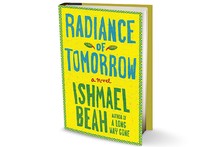Radiance of Tomorrow
By Ishmael Beah
256 pages;
Sarah Crichton Books
A former child soldier explores the world he left behind.
The American dream was born of Europeans immigrating to a new home, one free from oppression and ripe with opportunity. The characters in Ishmael Beah's affecting debut novel, Radiance of Tomorrow, also dream of a home—though for them the dream means reclaiming Imperi, Sierra Leone, the tiny village that sustained them for generations, now in the grip of inexorable change. And therein lies the conflict that will make you care about what happens to them.
Imperi is a dusty West African outpost much like the ones the author wrote about in his best-selling book, A Long Way Gone: Memoirs of a Boy Soldier. There, war's survivors regroup to rebuild and resuscitate their families, their homes, their futures.
Among the appealing characters who populate the tale, which reads like an allegory of the fits and starts of "progress," is Bockarie, a teacher who, with his wife, Kula, has managed to keep his family alive despite occasional separations and stays in refugee camps. There's also Bockarie's friend Benjamin, who abandons teaching to work for the new mining company that is simultaneously reviving and ruining Imperi and posing a moral dilemma for those who yearn to re-create the past but must accept change in order to survive.
There are people who give in to corruption without resistance, and others who hold out for as long as they can. A school principal named Mr. Fofanah belongs in the first category. He funnels the government money he receives into extravagant purchases, while students go without textbooks and teachers get paid only a small portion of the wages they're entitled to. He explains his actions by observing: "Where a cow is tied is where it grazes." But there is hope for the next generation, as the children and grandchildren of the elders "find a way to repair their broken hearts by relighting the fire that is now dull within them," as "old wisdom and new wisdom merge, and find room in the young."
— Mitchell S. Jackson


